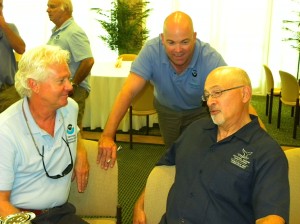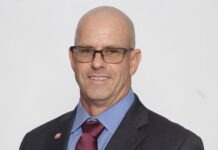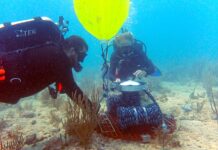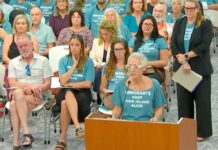
Sanctuary Advisory Council gets behind FWC pilot program
Since June, the county’s Marine Resources Director Rich Jones has spoken to countless stakeholders about the nearly quarter million dollars of county funding spent to remove derelict vessels from nearshore waters last year.
On Tuesday, during the monthly meeting of the Florida Keys National Marine Sanctuary Advisory Council, Superintendent Sean Morton said he felt that number should be adjusted.
“There are many more resources that go into addressing derelict vessels,” Morton said. “That number could easily be doubled.”

In a move commended by National Marine Sanctuaries Director Dan Basta, the Advisory Council officially pledged their support of the Florida Fish and Wildlife Conservation Commission’s Pilot Program for regulating mooring vessels outside of public mooring fields and establishing additional mooring fields within the sanctuary.
The Advisory Council, comprised of business owners, fishermen, scientists, municipal officials and residents, is an interactive liaison with the staff and management of the FKNMS. Each member applies to sit on the council because they have a vested interest in the health and vitality of Keys’ waters.
Basta referenced Fargo, North Dakota-based non-profit River Keepers that formed in 1990 to protect and preserve the integrity and natural environment of the Red River of the North. Of their own volition, a group of concerned citizens re-claimed a river in their own backyard and began cleaning it on their own time without any state or federal governance.
“Citizens are focusing on their own neighborhoods…it’s time for the government to start thinking differently about incentives and focus on saving the world one place at a time,” Basta suggested.
In 2009, Monroe County expressed an interest in participating in the pilot program to encourage boaters to use mooring fields; protect marine infrastructure and the environment; and deter improperly stored, abandoned or derelict vessels.
“We’re not doing this to hurt the cruising boater,” Jones insisted. “Florida loves cruisers! If we can clean up our waterways, it will help the cruising boaters.”
In three public workshops across Monroe County earlier this year, Jones’ presentation included slides of submerged engine blocks to which boats were moored, particularly in the Boca Chica Basin. In another photo, an anchor line was secured around the base of a fragile coral head.
“At low tide, it’s only a couple feet deep [in Boca Chica] so you can imagine what an engine block used as a mooring would do for navigation,” Jones told the council.
The county spent $273,570 to remove derelict and abandoned vessels in 2010 which Jones said came from vessel registration fees. Those monies could be better used to fund boat ramp improvements, installation of new channel markers and other marine infrastructure.
A current challenge for law enforcement in removing abandoned vessels that threaten water quality and navigation has been differentiating between a derelict or abandoned vessel and a floating structure.
“Derelict vessels are already illegal,” Jones noted. “We’re trying to create a mechanism to decrease them. We want to do everything we can to bring people into compliance, just like our code department.”
The portion of the pilot program that calls for mandating regular waste pumpouts for liveaboards has received unanimous support across the county during the public hearings according to Jones.
“We spend hundreds of millions of dollars installing a wastewater system, but then see boats dumping raw sewage,” Morton said. “The intent of all this work we’ve been doing is to reduce the amount of human sewage in the water.”





















